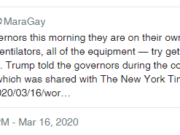If you live by executive power, you die by executive power. For more than 50 years, the rise of the administrative state has resulted in shifting power from lawmakers to bureaucrats and the Presidents they serve. In that same period, the Supreme Court created two doctrines out of thin air that ripped power from the people and Congress, making the judgment of bureaucrats and the presidents who direct their agencies nearly beyond question. These doctrines embrace agency deference at the expense of law making.
This systematic, frontal assault on federalism has resulted in a stronger central government and Presidency, all forged by a High Court that answers to no one. In that equation, who then is the loser? It is the people and their lawmakers. This shift is a consolidation of federal power into fewer hands. It is a repudiation of a government by the people and for the people. Lest you think this is an academic, esoteric, theoretical rant, let me explain how Mr. Trump just waded into the Grimm truth about agency deference and Transgender bathrooms … a struggle between the administrative state and the people.
In 2016, the Fourth Circuit Court of Appeals made national news when it ruled that Title IX created a federal right for transgender individuals to choose their own gender, and as such, use the bathroom of their choice. Congress passed Title IX in 1972. The 2016 Court decision on that 1972 law was a head-scratcher. Nothing about Title IX indicates that it is in any way related to transgender issues. The purpose of the law was to prevent institutions receiving federal funds from unfairly discriminating based on sex.
In 1972, no one associated Title IX with transgender individuals for one plainly obvious reason; the law had nothing to do with them. So imagine how surprising it was to find out that a school district in Virginia was violating the Title IX rights of a 17 year-old named Grimm who had decided she was a boy. How was the school violating Grimm’s rights? The school insisted that the individual use the bathroom associated with her biological sex, not the gender with which she identified.
What does all this have to do with bureaucrats, federalism, Supreme Court doctrines, and now President Trump? Here is the answer, and I promise, you won’t believe how your federal government has destroyed our representative republic.
In 2015, forty-three years after Title IX passed, and 35 years after the Department of Education adopted a regulation on it, President Obama directed a bureaucrat inside the Department of Education to issue an “opinion” on how to properly interpret Title IX and the agency’s regulation related to it. Now, hold on to your seat … this is big brother, big government, and big time crazy, all at work.
The agency bureaucrat issued an opinion stating that Title IX and its own regulation were “ambiguous.” The agency opinion sought to clear up what the word “sex” meant with respect to gender in 1972. Indeed, the word sex was not ambiguous at all; it referred to two biological genders. However, along came the agency to “clarify” that sex and gender were not determined by biology, but rather by individual choice. After interpreting its own regulation, the agency sent out a letter of guidance to all schools receiving any federal funds. That guidance let schools know how the agency “now” interpreted these decades’ old provisions. Since the federal government now gives federal funding to nearly every public school in America, the guidance essentially rewrote the law and made its new interpretation applicable to nearly everyone.
Then, along came the Grimm dispute. Grimm sued a Virginia school system alleging that it discriminated against him because while born a girl, Grimm now chooses to be a man. Thus, Grimm alleged, the school was forcing him to accept a gender he rejected, and to use a bathroom of a gender he believed was not his current gender. The Federal District Court ruled against Grimm. Suffice to say, it was unmoved by the argument that Title IX, passed in 1972, had anything at all to do with transgender individuals, nor was it passed to permit people to choose their respective genders. That legal decision by the Federal District Court was correct. Whatever rights people may have to live their lives as they so choose, Title IX just doesn’t address the issue as alleged.
The legal wheels then came off the bus in the Fourth Circuit.
Remember I wrote that the Supreme Court created two legal doctrines over time that helped transfer power to the executive and away from the people and Congress? Here is where those two pieces of administrative law, created by the Courts, came into play. What are they? They are Chevron and Auer deference.
Named after cases in which they originated, here is a simple explanation for what they mean. Auer deference means that an agency is entitled from any examining court to near absolute deference in interpreting its own regulations. Chevron deference means that an agency is entitled to near absolute deference when a court examines the agency’s interpretation of statutes Congress passes that an agency is charged with enforcing.
Let me be clear; the Supreme Court thinks unelected bureaucrats have a near unchallengeable deference about their own rules and Congress’s statutes that those agencies enforce on you on behalf of the Federal government. I am not making that up. I know scholars who spent their whole careers on these legal issues.
Try if you may to imagine our founding fathers gathered to vote on a new Constitution suggesting that unelected federal workers would enjoy a huge presumption of correctness in enforcing federal law against the people. Jefferson, Mason, Madison … who do you think would have carried that torch? It’s idiocy. On it’s face such a concept is at odds with the very founding of the republic. Nonetheless, those two doctrines, created by the Court, are at the heart and lifeline of the administrative state.
So … now we go back to the Grimm reality. The Fourth Circuit holds that the 2015 “guidance” and “opinion” on the interpretation of “sex” by an Obama agency appointee is owed “deference.” The Court therefore holds that the 1972 Title IX law, and the 1980 regulation used to enforce it by the Department of Education, now means what this 2015 bureaucrat says it means. In short, some bureaucrat who may not even have been born when lawmakers passed Title IX just amended it … by himself. That’s how Grimm won the case.
If you think all of that is interesting, then you will love what Mr. Trump did to pee in the deference punch bowl. Mr. Trump exposed the folly of a system that allows presidents through their administrative agencies to change the law on a whim, rather than to force lawmakers to make new law. He directed his Department of Education to rescind the 2015 “guidance.” Surprise, now there is no new interpretation, and there is no deference to be given it. Trump used the administrative state against both the administrative state and the judiciary that created this mess. So where are we?
Right now today, guess what case is pending before the Supreme Court? You got it, the curious case of Grimm. We have a high court with a 4-4 split getting ready to hear a case, the basis of which, just got gutted completely by the President when he returned the law back to its normal state circa 1972. If the Court were an honest judiciary following conservative principles, it would issue a one page order remanding the case back to the Fourth Circuit for a hearing based on the law as it now stands, and as it stood from 1972-2015. Of course, this is the same Court that created this mess, and they answer to no one. So, it is as good a guess as any what will happen in that case.
From a conservative perspective, of course, the issue is easy. The Constitution and Title IX are dead silent about choosing one’s gender. They are not ambiguous … they are silent. Hence, states are free to make and pass laws consistent with their own constitutions and the will of the people with respect to the use of public bathrooms. That’s federalism, and liberty wins when federalism thrives.
My personal view on the issue of bathroom usage is simple … we have laws for improper conduct in bathrooms. I don’t think we need more laws, but I don’t get to say what is right for each state or community.
As for Auer and Chevron deference, those two doctrines need to go.
Congress should pass a law today that removes deference for the federal government in interpreting its regulations or statutes. Congress makes laws, and only its members and their interpretation are subject to voter approval. The Court needs to get out of the lawmaking business, and the bureaucrats need to get out of the interpretation business. Let’s start showing some deference to the Constitution and federalism.
UPDATE: On March 6, 2017, the US Supreme Court refused to hear the Grimm case, and vacated the Fourth Circuit Court’s ruling in favor of Grimm. It remanded the case to the District Court for any further legal proceedings, exactly as I thought it should do. It was a loss for Grimm, but only because of the Trump administration’s re-interpretation of the Obama administration’s re-interpretation of a 1972 law.
Because the Court did not take the case on the merits, it did not reach the issue of the validity of these re-interpretations. Ruling as it did, it once again cemented the notion of agency deference.
Author: Richard Kelsey
Richard Kelsey is the Editor-in-Chief of Committed Conservative.
He is a trial Attorney and author of a #11 best-selling book on Amazon written on higher education, “Of Serfs and Lords: Why College Tuition is Creating a Debtor Class”
Rich is also the author of the new Murder-Mystery series, “The ABC’s of Murder,” book one is titled, “Adultery.”
Rich is a former Assistant Law School Dean and Law Professor. At Mason Law Kelsey conceived of, planned, and brought to fruition Mason’s Center for the Protection of Intellectual Property, known as CPIP, drawing on his expertise as a former CEO of a technology company specializing in combating cyber-fraud.
In 2014 he was elected by the graduating class as the faculty speaker at their graduation.
He is a regular commentator on legal and political issues in print, radio and on TV. Rich has appeared on hundreds of stations as a legal expert or political commentator. He provided the legal analysis for all stages of the Bob McDonnell trial and appeal for numerous outlets including NPR and WMAL.
Rich also writes on occasion for the American Spectator and CNSNews.com.
In his free time, Rich is part of the baseball mafia of Northern Virginia, serving on numerous boards and as a little league and travel baseball coach.
His Twitter handle is @richkelsey.
































